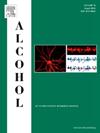慢性饮酒延迟从辣椒素和神经损伤引起的小鼠过敏的恢复。
IF 2.9
4区 医学
Q3 PHARMACOLOGY & PHARMACY
引用次数: 0
摘要
慢性疼痛和酒精使用障碍(AUD)是严重影响生活质量的主要健康问题。持续性疼痛在酒精依赖者中很常见,慢性疼痛患者通常使用酒精进行自我治疗。与这些疾病相关的神经机制尚不清楚。我们假设慢性酒精暴露诱导多种形式的超敏反应,并增加急性和持续性疼痛模型的恢复时间。在成年小鼠中使用两瓶自由选择的酒精消费模式,与年龄和性别匹配的饮水对照组相比,酒精诱导的超敏反应(AIH)在饮酒4-6周后发生,其机械戒断阈值降低。在AIH出现后,饮酒的雌性小鼠而不是雄性小鼠出现了冷过敏。为了评估慢性酒精摄入对急性和持续性疼痛的影响,我们分别使用了足底辣椒素和坐骨神经挤压模型。在辣椒素模型中,水处理而不是酒精处理的小鼠在注射后24小时从过敏中恢复过来。在坐骨神经挤压模型中,与饮水对照组相比,饮酒小鼠的机械戒断阈值恢复较慢。虽然饮水小鼠的机械超敏反应在术后3-4周恢复到术前阈值,但饮酒小鼠的恢复是延迟的和部分的。手术干预对酒精摄入量没有影响。总的来说,我们的研究结果表明,长期自愿饮酒通过延长过敏反应和延迟损伤恢复,促进了向慢性疼痛的过渡。本文章由计算机程序翻译,如有差异,请以英文原文为准。
Chronic alcohol drinking delays recovery from capsaicin- and nerve injury-induced hypersensitivity in mice
Chronic pain and alcohol use disorder (AUD) are major health concerns that significantly impair quality of life. Persistent pain is common in individuals with alcohol dependence, and alcohol is commonly used by chronic pain patients for self-medication. The neural mechanisms linking these conditions remain unclear. We hypothesized that chronic alcohol exposure induces hypersensitivity in multiple modalities and increases the duration of recovery in acute and persistent pain models. Using the two-bottle free-choice alcohol consumption paradigm in adult mice, alcohol-induced hypersensitivity (AIH), indicated by reduced mechanical withdrawal thresholds, developed after 4–6 weeks of alcohol consumption compared to age- and sex-matched water-consuming controls. Alcohol-consuming female mice, but not male mice, developed cold hypersensitivity after AIH emerged. To assess the impact of chronic alcohol consumption on acute and persistent pain, we used intraplantar capsaicin and sciatic nerve crush models, respectively. In the capsaicin model, water-treated, but not alcohol-treated, mice recovered from hypersensitivity by 24 h post-injection. In the sciatic nerve crush model, alcohol-consuming mice exhibited slower recovery of mechanical withdrawal thresholds compared to water-consuming controls. While mechanical hypersensitivity in water-consuming mice returned to pre-surgical thresholds by 3–4 weeks post-surgery, recovery in alcohol-consuming mice was both delayed and partial. Surgical intervention did not impact alcohol intake. Overall, our results suggest that chronic voluntary alcohol consumption facilitates the transition to chronic pain by prolonging hypersensitivity and delaying recovery from injuries.
求助全文
通过发布文献求助,成功后即可免费获取论文全文。
去求助
来源期刊

Alcohol
医学-毒理学
CiteScore
4.60
自引率
4.30%
发文量
74
审稿时长
15.6 weeks
期刊介绍:
Alcohol is an international, peer-reviewed journal that is devoted to publishing multi-disciplinary biomedical research on all aspects of the actions or effects of alcohol on the nervous system or on other organ systems. Emphasis is given to studies into the causes and consequences of alcohol abuse and alcoholism, and biomedical aspects of diagnosis, etiology, treatment or prevention of alcohol-related health effects.
Intended for both research scientists and practicing clinicians, the journal publishes original research on the neurobiological, neurobehavioral, and pathophysiological processes associated with alcohol drinking, alcohol abuse, alcohol-seeking behavior, tolerance, dependence, withdrawal, protracted abstinence, and relapse. In addition, the journal reports studies on the effects alcohol on brain mechanisms of neuroplasticity over the life span, biological factors associated with adolescent alcohol abuse, pharmacotherapeutic strategies in the treatment of alcoholism, biological and biochemical markers of alcohol abuse and alcoholism, pathological effects of uncontrolled drinking, biomedical and molecular factors in the effects on liver, immune system, and other organ systems, and biomedical aspects of fetal alcohol spectrum disorder including mechanisms of damage, diagnosis and early detection, treatment, and prevention. Articles are published from all levels of biomedical inquiry, including the following: molecular and cellular studies of alcohol''s actions in vitro and in vivo; animal model studies of genetic, pharmacological, behavioral, developmental or pathophysiological aspects of alcohol; human studies of genetic, behavioral, cognitive, neuroimaging, or pathological aspects of alcohol drinking; clinical studies of diagnosis (including dual diagnosis), treatment, prevention, and epidemiology. The journal will publish 9 issues per year; the accepted abbreviation for Alcohol for bibliographic citation is Alcohol.
 求助内容:
求助内容: 应助结果提醒方式:
应助结果提醒方式:


